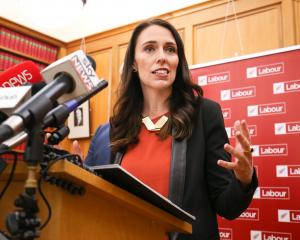There is global turmoil and the forces on Labour's side of politics are divided.
Answer: get together, to build a voice against a conservative coalition.
The year: 1916.
Come to 2016: there is global turmoil and Labour and the Greens have got together to build a voice against a conservative coalition.
Is this book-end history or a phase? That is the question for those celebrating Labour's centenary.
A new history of the party formed on July 7-8, 1916, to improve wage workers' lot and even up life chances will be launched on Thursday.
On Friday, a day-long seminar will include a keynote assessment of the 100 years by former historian, acute intellectual and formidable 1999-2008 minister Michael Cullen, a mixer of one-liners and sharp wisdom (contrast National's bland-leading-the-bland conference last weekend).
Sir Michael was chief whip, then a minister in the 1984-90 government which, though it boosted social assistance, banned nuclear ships and Springbok tours and set us en route to a bicultural society - all true to Labour - ripped the party apart with un-Labour radical market-led economic reforms.
This compounded Sir Robert Muldoon's 1970s pitch to ``ordinary blokes'', which siphoned off wage-worker votes.
Since then, like social democratic parties in other liberal democracies, Labour has not worked out how to rebuild a broad social base.
Helen Clark's and Sir Michael's capable cabinet masked this erosion, helped by a credit-fuelled boom and skilful coalition management to creditable low-40s votes in 2002 and 2005. But blokey John Key has removed the mask again.
Hence Labour's disastrous 25% vote in 2014. But, unlike National after its disaster in 2002, Labour chose not to do a root-and-branch shakeup.
Labour will take a step on Saturday afternoon with a special conference to adjust the list selection process to preferential membership-wide regional selections and a smaller-than-2014 committee to finalise the national list.
There is no suggestion - at least not officially - of a "man ban'' of the sort dumped on the hapless David Shearer in 2013 to lift the proportion of women MPs.
But the 2017 election challenges go far beyond the list.
One is to get Andrew Little connecting. Mr Little's strength is that he is a straight-shooter. But communications team mistakes and his own political inexperience and need to score points have skewed his aim at times and sometimes the bullets have ricocheted.
Examples: an unthought-through attack that caught up Jacinda Ardern's (innocent) father and shining a media light on a "homeless'' family that was actually renovating its house.
Mr Little cannot out-Key Key. But he needs to out-Little Little. Mike Munro, a political journalist then chief press officer to Helen Clark and more recently a corporate communicator, including for the Todd Corporation, is said to have been called in for strategic advice.
Labour's second 2017 challenge is to present a government-in-waiting. In 2011 and 2014, those who wanted a change of government had no visible alternative to vote for. Labour was too weak.
The deal with the Greens potentially provides that alternative. Mr Little was bowled over by his reception at the Greens' conference. Mr Little and Green co-leader James Shaw have been doing some joint business briefings.
By belatedly conceding Labour is not a 45% party and cannot do command performances as National can but must have a partner, Labour has changed the electoral game.
Whether Labour+Greens can win that changed game will depend in part on how convincing the coalition looks. There is a growing understanding on both sides that they will need three or more major joint - "coalition'' - policies.
A starting point is that both agree that "trickle down'' stops too far up and not "all boats rise'' with GDP, as market prophets expected, because too many have holes. Both argue that implies different policy fundamentals.
So one joint policy will likely stem from the material emerging from Grant Robertson's "future of work'' inquiry. Mr Robertson, who is friendly with Mr Shaw, talks of government partnerships "building wealth from the ground up'' - regional, small-business, entrepreneurs, low-carbon - a concept most Greens could agree with. Likewise help for those displaced by change.
But what about the longer term? Is Labour now forever shackled to the Greens? Might the Greens even morph into the senior partner?
The new Labour history - a valuable reference, though tentative on the fraught 1984-90 period - dismisses near the end commentators who, it says, "are keen enough to suggest that, like most centenarians, the party will receive a telegram from the Queen before quietly shuffling off this mortal coil''.
"Telegram'' in this email age? That technological anachronism is an apt analogy for Labour's updating task at 100. As in 1916, Labour in 2016 is in turbulent times with big global and societal changes under way that will test it to destruction, or revitalise it.
Colin James is a leading social and political commentator. ColinJames@synapsis.co.nz












